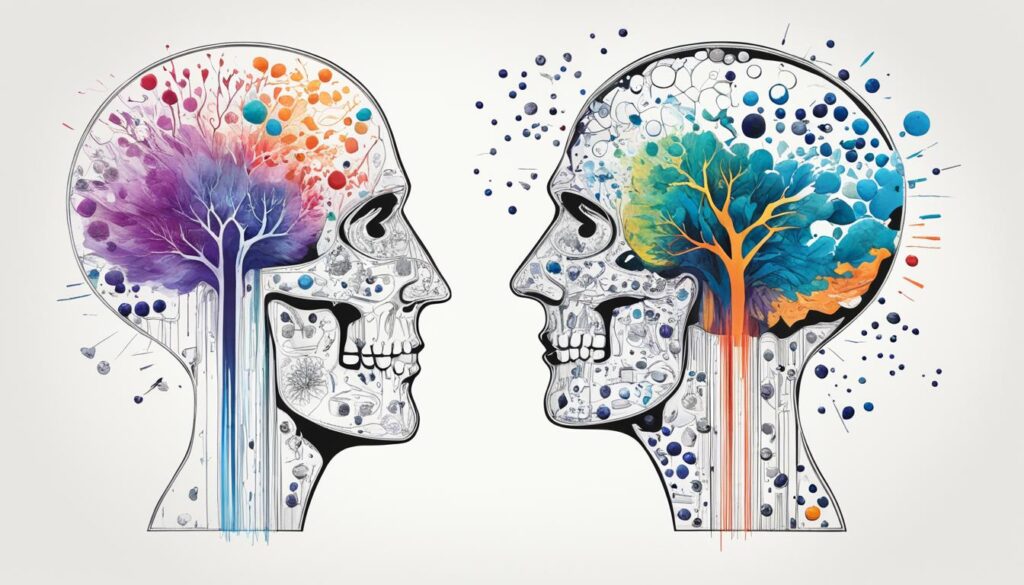Did you know that despite global income levels rising, average happiness has hardly increased? This staggering fact highlights the paradoxical nature of relative deprivation, a psychological condition that stems from not maintaining a comparable living standard to one’s peers.
Relative deprivation leads to a decrease in well-being and can impose significant challenges in achieving a fulfilled life. Policies like consumption taxes and redistributive measures have been suggested to tackle the impacts of relative deprivation. Understanding this complex phenomenon and learning strategies to effectively manage and overcome its challenges is imperative for personal growth and overall well-being.
Key Takeaways:
- Understanding the paradox of rising income yet unchanged happiness levels.
- How relative deprivation affects well-being and creates psychological challenges.
- The role of social comparison in experiencing relative deprivation.
- Effective strategies to overcome social comparison and achieve personal growth.
- The importance of policy interventions like consumption taxes.
- Insights into living a more fulfilled life despite economic disparities.
Introduction to Relative Deprivation
Relative deprivation is a fundamental concept for understanding inequality as it reflects a condition where individuals perceive themselves to be worse off compared to others. This feeling of deprivation arises not from absolute poverty but from a comparison with peers or societal standards. Addressing relative deprivation is essential for advancing social justice and improving overall psychological well-being.
Definition of Relative Deprivation
The relative deprivation definition pertains to the experience of feeling deprived of something to which one believes they are entitled. It encapsulates the discontent people feel when they compare their situations unfavorably to others’. This definition underscores the psychological aspect, where perceived inequality, rather than actual deprivation, triggers emotional responses.
Historical Context
Historically, the notion of relative deprivation gained prominence after World War II, when societal analysts examined the contrasts between reducing absolute poverty and perceived worsening conditions among different social groups. The seminal works of sociologists like Samuel Stouffer highlighted how soldiers’ morale was influenced not by their absolute conditions, but by their comparatives. Over time, this concept has been crucial in understanding inequality within both wealthy and developing nations.
Importance of Understanding Relative Deprivation
Understanding relative deprivation is vital for several reasons. First, it helps in recognizing the broader impacts of perceived inequality on mental health and life satisfaction. Second, it intertwines with social justice, highlighting how disparities are not solely economic but also psychological. Lastly, this understanding aids policymakers in creating more inclusive and equitable economic strategies.
| Aspect | Relative Deprivation | Absolute Poverty |
|---|---|---|
| Definition | Feeling deprived compared to others | Insufficient resources to meet basic needs |
| Measurement | Subjective and comparative | Objective and fixed |
| Impact | Psychological and social well-being | Physical survival needs |
| Policy Focus | Addressing inequalities, social justice | Providing basic sustenance and aid |
The Role of Social Comparison
Social comparison is a fundamental aspect of human behavior, influencing how we perceive ourselves and our place in society. Freud and Maslow, among others, have acknowledged the quest for self-understanding through the lens of others. Whether we engage in upward or downward comparisons, the effect on our mental state can be substantial.
Upward vs. Downward Social Comparison
Upward social comparison occurs when individuals compare themselves to those they perceive as superior in some way. This could be a colleague who receives more accolades or a social media influencer with a lavish lifestyle. While this can provide motivation for self-improvement, it also can lead to feelings of inadequacy and frustration.
On the opposite end, downward social comparison involves comparing oneself with those perceived as worse off. This kind of comparison can bolster self-esteem and alleviate feelings of inferiority, but it might also foster complacency and inhibit personal growth.
Impact on Psychological Health
Engaging in social comparison deeply intertwines with the impact on psychological health. The social comparison theory suggests that our self-worth is often influenced by how we stack up against others. When we habitually engage in upward comparisons, the potential impact on psychological health includes stress, anxiety, and even depression.
Conversely, downward comparisons can sometimes provide temporary relief and a boost in self-confidence. However, the long-term reliance on this kind of comparison might stymie one’s motivation to improve, leading to a stagnant sense of self-worth and potential mental health issues.
Examples in Everyday Life
In our daily lives, social comparison examples abound. At work, I might compare my achievements to those of a peer who was promoted, driving my ambition but also potentially generating stress. Similarly, browsing social media can create a virtual arena for constant upward comparisons, where curated images of peers’ successes and happiness create a skewed standard of reality.
There are numerous areas where social comparison is evident. Here are a few prominent examples:
- Professional achievements and recognitions
- Physical appearances and health benchmarks
- Material possessions like cars, homes, and gadgets
- Social media portrayals of everyday life
Understanding how social comparison theory and these social comparison examples manifest in our everyday life can help us mitigate their impact on psychological health and strive for a more balanced outlook.
Inequality and Relative Deprivation
Understanding the nuances between relative deprivation and absolute poverty is crucial when analyzing economic disparities. While absolute poverty examines the inability to meet basic subsistence needs, relative deprivation focuses on the inadequacy of resources to sustain a comparably acceptable standard of living.
Relative Deprivation vs. Absolute Poverty
Inequality manifests differently in the context of relative deprivation versus absolute poverty. Absolute poverty assesses the essentials, such as food, shelter, and clean water, that one must have to survive. In contrast, relative deprivation evaluates whether individuals can participate fully in society, considering education, healthcare, and social activities. Thus, economic disparities become more pronounced under relative standards.
Social and Economic Implications
The social and economic implications of relative deprivation are profound. This phenomenon often leads to increased social stratification, where the gap between various socio-economic classes widens. This intensification of inequality can result in mental health issues and reduced overall life satisfaction. Addressing economic disparities thus requires a holistic approach that considers both relative and absolute scales of poverty.
Case Studies of Inequality
Case studies from different parts of the world illustrate how inequality and relative deprivation play out in various socio-economic contexts. For instance, in the United States, the focus often lies on the relative quality of life and social mobility, whereas countries like India may grapple more with absolute poverty. These diverse examples underscore the significant economic disparities and necessitate tailored strategies to mitigate the impact of relative deprivation globally.
Social Psychology Behind Relative Deprivation
Understanding the phenomenon of relative deprivation involves delving into the core concepts provided by social psychology. By exploring various theories and models, we begin to unravel the mechanisms shaping this intriguing psychological condition.
Theories and Models
Social psychology offers a robust framework for examining relative deprivation through various theories such as comparison theory. This theory suggests that individuals continuously compare their situations with those of others, influencing their perceptions of inequality and well-being. Evolutionary perspectives and stress-response frameworks dive deeper into why humans are inherently predisposed to such comparative assessments.
Empirical Evidence
Empirical evidence on relative deprivation substantiates these theories through extensive research spanning public health, economics, and other fields. Studies reveal that the impacts of relative deprivation extend beyond subjective feelings, contributing to measurable declines in mental and physical health. Noteworthy findings underscore how comparison theory impacts societal structures and individual experiences, offering a comprehensive understanding of this multifaceted issue.
Relative Deprivation and Health Risks
It is well-documented that the health risks associated with relative deprivation extend beyond mere financial stress, deeply impacting both physical and mental health. When individuals perceive themselves as less privileged compared to their peers, the resultant feelings of inadequacy can manifest in serious health consequences.
Physical Health Impacts
Relative deprivation doesn’t just influence how we feel mentally, but it also takes a toll on our bodies. This psychological stress can elevate the risk of chronic conditions like hypertension, heart disease, and diabetes. The constant strain of feeling less than others can weaken the immune system, making us more susceptible to illnesses.
Mental Health Consequences
The mental health consequences of relative deprivation are profound. Individuals experiencing relative deprivation often face increased levels of stress, anxiety, and depression. The ongoing battle of comparing oneself to others can lead to a diminished sense of life satisfaction. When one consistently feels they are falling short of societal norms, it can erode self-esteem and foster feelings of hopelessness.
Feeling left behind when everyone around me seemed to be moving ahead wreaked havoc on my mental well-being,” shared a relatable person. “It took years of therapy and self-reflection to overcome the detrimental impact this had on my life.”
Understanding the intricate relationship between social comparisons and their tangible impacts on health underscores the need to address the psychological roots of relative deprivation. By acknowledging these health risks associated with relative deprivation, we can pave the way for strategies to mitigate the mental health consequences and promote overall well-being.
Economic Disparities and Relative Deprivation
Economic disparities play a crucial role in shaping feelings of relative deprivation. Understanding how income inequality and consumption patterns affect overall well-being is essential for addressing these issues.
Income Inequality
Income inequality exacerbates the sense of relative deprivation, as individuals frequently compare their financial situation with those more affluent. This disparity often triggers emotional and psychological stress, leading to a domino effect on individual and communal well-being.
Consumption Patterns
Consumption patterns driven by status-seeking behavior further illuminate the impacts of economic disparities. Many strive to bridge the gap created by income inequality by engaging in conspicuous consumption, which can lead to financial strain and diminished quality of life.
Impact on Overall Well-being
The compounding pressures from income inequality and consumption patterns have profound effects on well-being. The mental strain and financial difficulties resulting from trying to ‘keep up’ can severely impact overall satisfaction and quality of life, underscoring the need for solutions to address these issues.
| Aspect | Impact |
|---|---|
| Income Inequality | Leads to heightened stress and anxiety |
| Consumption Patterns | Causes financial strain |
| Overall Well-being | Results in lower life satisfaction |
Psychological Distress Caused by Relative Deprivation
Understanding the depths of psychological distress induced by relative deprivation begins with examining its roots in social psychology. Feelings of resentment and anger often arise from continuous social comparisons and perceived injustices.
Such emotional turmoil is more than just fleeting discomfort. It often evolves into chronic stress, leading to various mental health issues. The intricate relationship between psychological distress and mental health demands a thorough dissection to uncover effective coping mechanisms.
One essential aspect to consider is how societal norms and comparisons shape our mental well-being. When individuals perceive that they are consistently falling behind, even if their basic needs are met, it sets the stage for distress. This cumulative effect, embedded deeply in social psychology, requires an acknowledgment of both individual and collective experiences.
These feelings of deprivation are not isolated; they ripple outwards, impacting various areas of life. As such, the interconnectedness between psychological distress, social psychology, and mental health cannot be overstated. Addressing these issues at both personal and societal levels is crucial in mitigating their long-term impact.
| Factors | Effects | Interventions |
|---|---|---|
| Social Comparisons | Increased Resentment | Therapy & Social Support |
| Perceived Inequity | Chronic Stress | Stress Management Techniques |
| Lack of Resources | Mental Health Issues | Access to Mental Health Services |
Overcoming Relative Deprivation
Overcoming relative deprivation requires a multifaceted approach, incorporating personal, community, and policy perspectives. To address this issue effectively, individuals and communities must engage in purposeful actions and interventions aimed at fostering resilience and well-being.
Strategies for Personal Development
Developing a robust set of personal development strategies is crucial in overcoming relative deprivation. Focusing on self-improvement, setting achievable goals, and practicing gratitude can empower individuals to shift their perspectives. Embracing these strategies can help in fostering a sense of accomplishment and self-worth, balancing the negative effects of comparison with others.
Community and Policy Measures
Community support and proactive policy measures play an essential role in mitigating the impacts of relative deprivation. Creating inclusive and supportive environments where resources are equitably distributed can foster a sense of belonging and reduce social disparities. Policy measures aimed at reducing income inequality and enhancing social mobility are critical in addressing the root causes of relative deprivation.
Psychological Interventions
Psychological interventions are pivotal in helping individuals overcome relative deprivation. Cognitive-behavioral therapy and resilience training can aid in restructuring negative thought patterns and fostering a more positive outlook. These interventions help individuals build resilience, develop coping mechanisms, and enhance overall mental health.
| Strategy | Description | Benefits |
|---|---|---|
| Personal Development | Focus on self-improvement and setting goals. | Fosters self-worth and accomplishment. |
| Community Support | Create supportive, inclusive environments. | Reduces social disparities and enhances belonging. |
| Policy Measures | Implement policies to reduce income inequality and enhance social mobility. | Addresses root causes and promotes equity. |
| Psychological Interventions | Cognitive-behavioral therapy and resilience training. | Builds resilience and improves mental health. |
Role of Resilience in Combating Relative Deprivation
Resilience is an essential attribute when it comes to combating relative deprivation. It is the capacity to endure and rebound from psychological setbacks that arise from comparing oneself to others who appear better off. The role of resilience becomes even more crucial in a society where social comparison is inevitable.
Cultivating resilience involves fostering strong social support networks. Close-knit relationships with family and friends provide a buffer against the negative feelings associated with relative deprivation. Additionally, developing effective coping strategies can significantly enhance one’s ability to navigate the emotional turbulence that comes with perceived inequalities.
Moreover, personal growth is often a result of overcoming the challenges posed by relative deprivation. By focusing on personal achievements and self-improvement, individuals can shift their attention from what they lack compared to others to what they can accomplish. This mindset not only helps in combating relative deprivation but also fosters a more fulfilling and balanced life.
Empowering oneself through resilience is not merely about bouncing back but also about thriving despite the comparative pressures of society. It allows for a transformation of perspective, emphasizing personal growth and the value of our unique journeys.
“Resilience is not just about recovering but about transforming adversity into an opportunity for growth and well-being.” – Brene Brown
The Impact of Belief Systems
Understanding belief systems can illuminate how people cope with relative deprivation. One prominent concept within this realm is the belief in a just world. This belief posits that individuals who maintain a sense that life is fair and people get what they deserve can significantly bolster their resilience and life satisfaction, even when confronting inequalities.
Belief in a Just World
Believing in a just world can serve as a psychological safeguard. It allows individuals to perceive their circumstances as fair or temporary, reducing feelings of resentment and encouraging patience and perseverance. This belief can transform how one interprets setbacks, viewing them as temporary hurdles rather than insurmountable barriers.
Impact on Resilience
This conviction profoundly impacts resilience. When I perceive the world as just, I am more likely to engage in proactive behaviors and maintain optimism. Such resilience is not merely a passive acceptance but an active engagement, leading to effective coping strategies and emotional stability. It nurtures hope and cultivates a mindset geared towards problem-solving rather than helplessness.
Strategies to Enhance Positive Beliefs
To fortify such positive beliefs, several strategies can be effective. First, practicing gratitude can shift focus from what I lack to what I possess. Second, engaging in community service can provide a broader perspective on life’s fairness, reinforcing the idea of positive reciprocity. Lastly, mindfulness practices can help in accepting present circumstances while fostering a proactive, hopeful outlook towards future endeavors. Enhancing belief in a just world can reframe my perception, allowing me to better endure and thrive despite relative deprivation.






